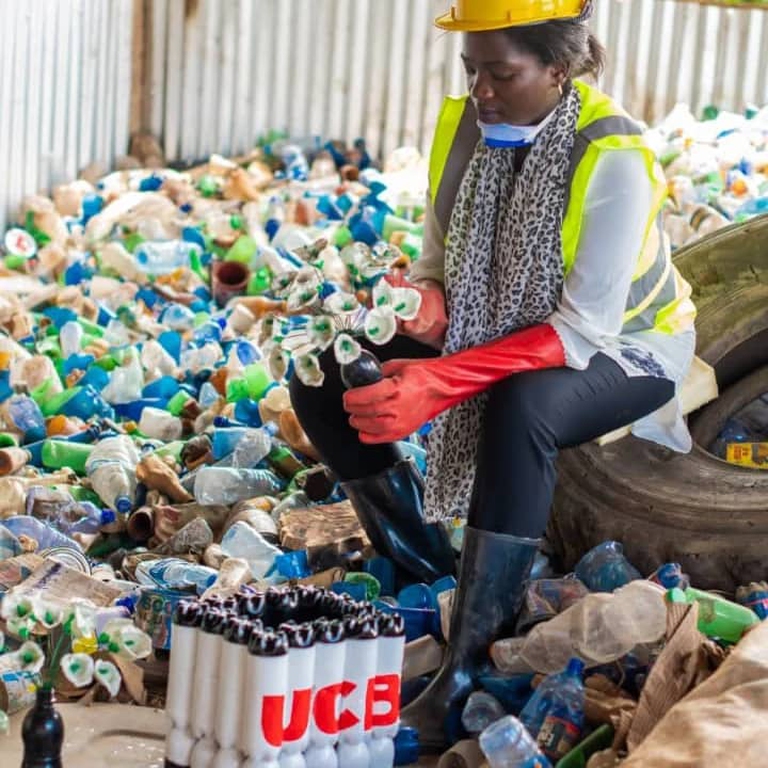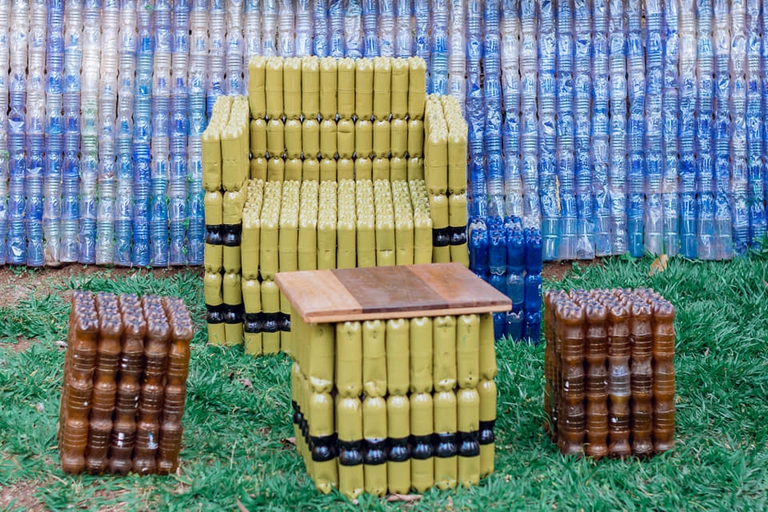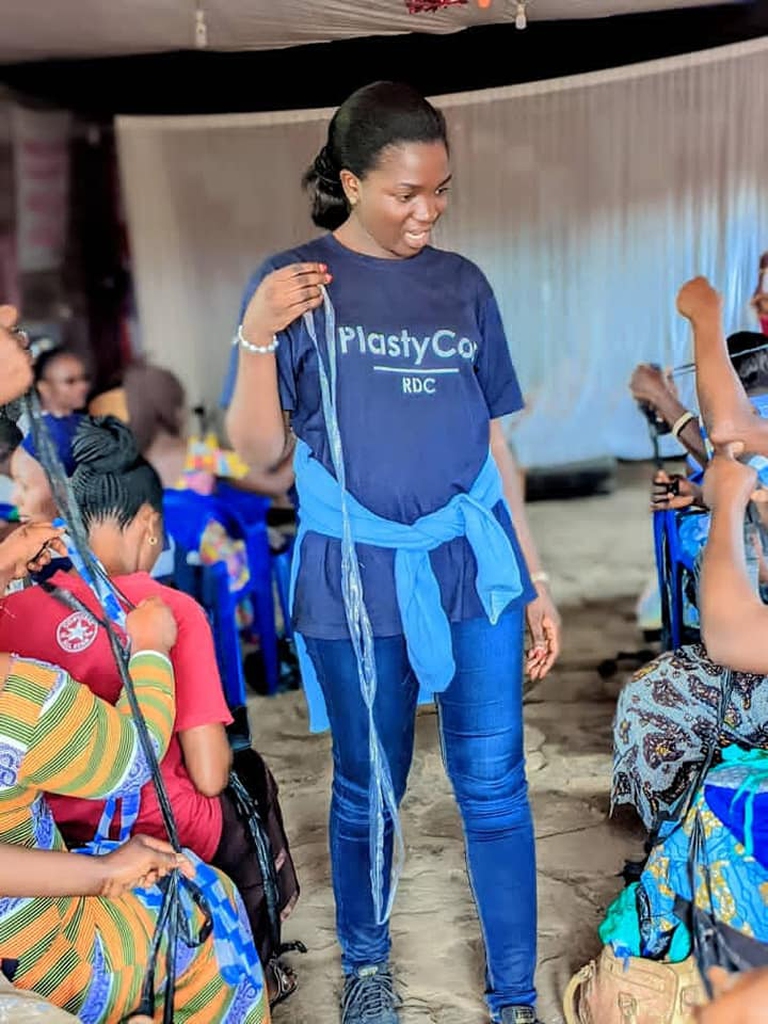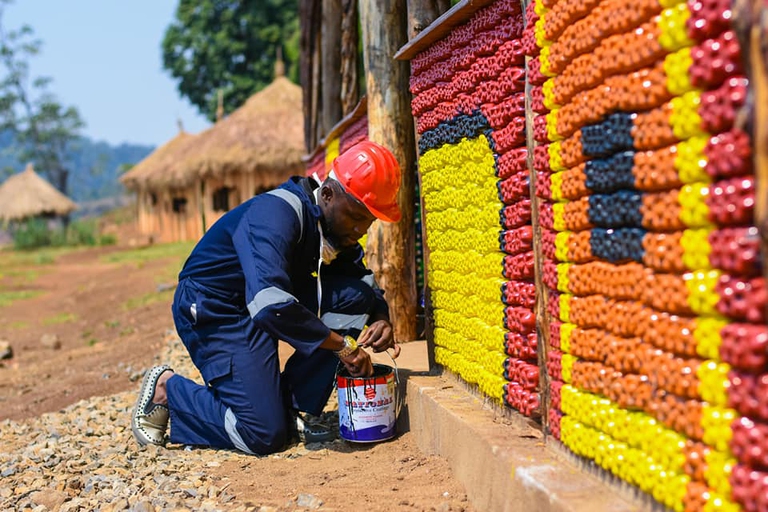
A report by Ember explains that in 2025 electricity generation from renewables (solar, wind and hydropower) surpassed that from fossil fuel sources.
Nicole Menemene founded Plastycor to help fight plastic pollution, inspiring women and young people to join the cause and protect the environment.
Nicole Menemene is the 30-year-old Chief Executive Officer (CEO) of Plastycor, a commercial establishment that recycles old plastic waste collected from lakeshores and dumpsites to make baskets, flowerpots, garbage cans, stools, and pedestal tables. The young entrepreneur works with a local network of young people in the Democratic Republic of Congo (DRC) to reduce plastic pollution. Nicole’s company has 10 employees, but her goal is to “industrialise” their work. With her project and other local efforts, Menemene hopes to see a “90 per cent reduction of Lake Kivu’s pollution“.
“The idea of creating Plastycor came to my mind in 2016 when I saw a growing plastic waste invading rivers and clogging gutters. I started seeing local inhabitants disposing of waste in lakes and rivers. I was constantly appalled by our people’s attitude and behaviour towards the environment. It was at this point I started taking matters into my own hands. I embarked on an ambitious awareness campaign drive to educate the local people in my community about the dangers of plastic pollution and how the scourge can alter habitats and natural processes, thereby reducing ecosystems’ ability to adapt to climate change,” Menemene explained in an interview.
After collecting the plastic waste, Nicole and her team transform it into bouquets of flowers and artistic paintings. Nicole manufactures armchairs, shelves, multi-use baskets, and walls, with and without masonry. The said products are directly purchased by individuals but also by non-profit organizations. She said the profit generated is reinvested into the recycling business. In addition, Nicole shared that in 2022, her company collected more than 10 tonnes of old plastic waste from the lakes and rivers.
In 2020, Plastycor collected more than 18,000 old plastic bottles to construct a house in the Katana village, located about 43 kilometres from the city of Bukavu in South Kivu province. To carry out all these works, Nicole collaborated with young people. “That’s what I tell everyone, when a young person arrives in the world of plastic recycling, I’m going to teach them something, but tomorrow it’s them who can teach me something in turn. This job requires us to touch the dirt all day long and unfortunately, not everyone is ready to do that. So for me when I see these young people working with dedication and tirelessly, it encourages me to keep working hard,” said Nicole.
Nicole told LifeGate that she still works in an artisanal way, adding that this has slowed down Plastycor’s processes, especially since the company lacks sufficient capital to procure machines to recycle plastic waste. Menemene also disclosed that in 2022, her company collected at least ten tonnes of plastic waste. “The work is done by hand”, said Menemene, but the ideal would be “to industrialize what we do. We are passionate about what we do and we would appreciate it if more people can come on board and support our noble cause,” whose major goal is to contribute to “a 90% reduction of the pollution of Lake Kivu”.
Menemene called on the Congolese government to support young entrepreneurs. “I’m calling my fellow Congolese to adopt responsible behavior by avoiding throwing plastic waste. Please try to buy recycled products made locally. I strongly believe that the cities of my beautiful country one day will be beautiful again.”
The Ruzizi Hydroelectric Power Station in South Kivu province has been polluted by thousands of bottles, cans and other objects thrown into the Ruzizi river that routinely clog the hydropower station’s turbines, shutting it down for months at a time and plunging the city into darkness. “The plastic waste is constantly piling up in the installations at a depth of 14 metres. Sadly, divers have to clean the bottom of the river to prevent the turbines from being clogged with plastic waste to avoid power cuts to our cities,” explained Liévin Chizungu, head of production at the Ruzizi 1 power station.
“As the lake flows towards the Ruzizi River, little by little all the waste that is thrown in comes to rest here. Even the waste coming from Goma, to the north of the Ruzizi River. What is happening here is a terrible environmental disaster. In recent months, one of the four units in the plant was damaged by debris. Unfortunately, it is still down, ” he revealed. According to the United Nations Environment Program, 70%–80% of the municipal solid waste generated across the continent is recyclable, yet only 4% is recycled.
Thus, it is clear that plastic pollution is not only an environmental disaster in Africa but also a major socio-economic development challenge. This is because plastic waste not only negatively impacts socio-economic activities but also the biodiversity that drives tourism, agriculture, and fisheries as well as affects infrastructural development and growth.
Siamo anche su WhatsApp. Segui il canale ufficiale LifeGate per restare aggiornata, aggiornato sulle ultime notizie e sulle nostre attività.
![]()
Quest'opera è distribuita con Licenza Creative Commons Attribuzione - Non commerciale - Non opere derivate 4.0 Internazionale.
A report by Ember explains that in 2025 electricity generation from renewables (solar, wind and hydropower) surpassed that from fossil fuel sources.
The Tyler Prize, considered the “Nobel Prize for the Environment,” has been awarded to Toby Kiers, an American biologist working in Amsterdam.
Belgium is one of the countries most exposed to climate change. Dune–dikes are a solution to curb sea-level rise.
Between October 2024 and September 2025, the average temperature in the Arctic was 1.6 degrees Celsius higher than during the 1991–2020 period.
Undeclared conflicts of interest, paid authors, lack of transparency: one of the most cited studies on glyphosate, published in 2000, has been retracted.
The Copernicus service has released data for the first eleven months of 2025: global warming is set to come close to last year’s record.
The European Council and Parliament have reached an agreement on the European Commission’s proposal to deregulate new GMOs. But farming, organic agriculture, and environmental organizations are calling for it to be stopped.
The world’s second-largest producer has taken a historic decision. However, farms will have until 2034 to shut down.
A Greenpeace report denounces Russia’s political and economic model: a nexus of extractivism, authoritarianism and war that is destroying the environment, with serious repercussions for the global ecosystem.











